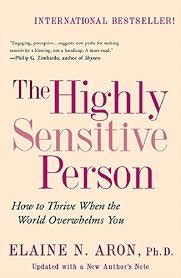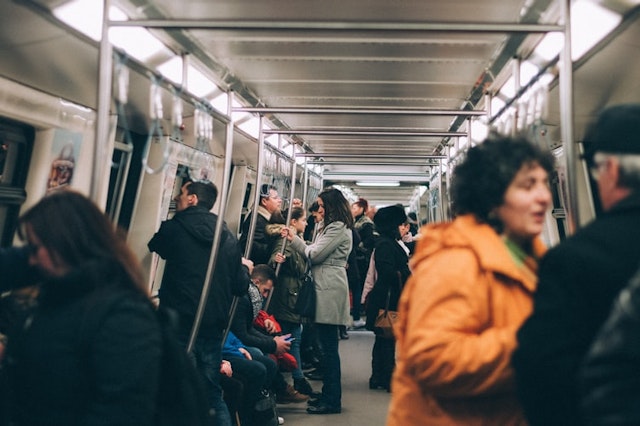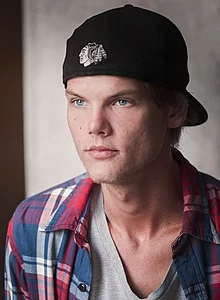What is a 'highly sensitive person' (HSP)?
In the last 7 years, there have been two major breakthroughs that I have experienced:
1. Realising that I am an introvert.
2. Realising that I am a highly sensitive person (a HSP).
(And, actually, realising that I'm an INFP, which came in between both of the above).
My discovery of being an HSP came from my introverted-related reading, when I stumbled across the work of Dr. Elaine Aron. Truth be told, I already had a hunch there was some connection between introverts and sensitive people.
So, what actually *is* an HSP?
The phrase itself, 'highly sensitive person', was coined by Dr. Aron who is considered the authority on the subject. She began researching high sensitivity as far back as 1991 and continues to research the subject today.

Really, it's self-explanatory. Highly sensitive people are exactly that… highly sensitive. They are more sensitive to their environments and surroundings, more readily taking in energy through their senses. Of course, as always, we are all unique and beautiful and complex individuals - and so the degree of our sensitivity varies and, even our sensitivity to different stimuli might vary (for example, a HSP might be particularly sensitive to smell, but not light).
That said, our 5 senses are more sensitive to (affected by) stimuli than the average person.
Me, my high sensitivity & a memorable Swedish story
I always described myself as a sensitive person, in the traditional sense of the word. I knew was a sensitive child, and I would (and still do) find songs and films particularly moving (I used to cry at during films in my teens, and I have also gotten teary-eyed at various moments during my adulthood). I really *feel* things, and absorb the energy from around me.
This is why I am particularly careful these days about the company I keep. It's also why I had a now infamous mini-meltdown in the car on a family trip to Sweden, an occasion my family still remember well…
Here’s what happened: several days into our driving around the Swedish archipelagos for hours at a time, the 4 of us together in a car at close quarters, and with the same couple of CDs playing music. I even had to resort to listening to my own music through my headphones to give myself some variety - and I had to put this music on loud in my ears to drown out the car music.
After several hours of driving, sat in a warm car and with noise constantly in my ears… I flipped.
I was sensorily-overloaded and overwhelmed. I was probably also tired and in need of water in a hot, stuffy car.
My high-sensitivity is the reason why I would feel so utterly exhausted from a day's work in my sales job in the city, plus long commute each way.
It is also the reason why, if I go out for a drink and have a late night, or drink a coffee (whatever time of day), or tuck into a bag of Haribo sweets (I can never have just a handful), I find myself over-aroused and hyperactive for a time, with the (sugar) high inevitably followed by a depletion in mood.
With my high sensitivity comes high empathy, an ability to tune into others feelings and easily relate to them, feel what they feel, and thus respond accordingly and put them at ease. It’s a gift as well as a curse, more on that below.
Anyway, that's high sensitivity in my words.
High sensitivity, according to Dr. Elaine Aron (aka 'the guru')
Over to Dr. Aron, the expert, who says:
- It is normal
- It is innate
- You are more aware than others of subtleties
- You are also more easily overwhelmed
- The trait is not a new discovery, but it has been misunderstood
- Sensitivity is valued differently in different cultures
Interestingly, her research has found that that roughly 70% of HSPs are introverts, 30% are extroverts.
So what does being an HSP mean in actuality, and what benefits does it give rise to?
You can read about some of those over here on a couple of awesome blogs for introverted and highly sensitive folks, IntrovertDear and HighlySensitiveRefuge.
Ultimately, high sensitivity is a beautiful gift. We can often be content with the simple things in life (e.g. a nice bath, a cosy night indoors), we feel things and make connections that others miss, we judge others' personalities/characterise and empathise well, we don't need much alcohol/coffee (if any!), we notice things that others miss, we can process things at a deeper level, we're very empathetic and intuitive, the list goes on…
Many of the great creatives and artists of time past and present were HSPs. Tim Bergling, the artist better known as Avicii, was a self-confessed introvert and, I suspect, a highly sensitive one.
I suspect plenty of others were/are too (e.g. Kurt Cobain, Sia, Lorde, John Lennon, Barbara Streisand, Mozart and probably a whole host of others).
However, with great power comes great responsibility... or, in other words, with those 'highly sensitive' advantages there comes a flip-side.
Us HSPs need to nurture ourselves in other ways that the average person might not necessarily need. For example, by managing our environments and schedules so that we function at our best and don't get overwhelmed or worn out.
Getting enough (high-quality) sleep and not drinking too much alcohol or caffeine (both are a rarity for me, personally) are a couple of examples. I have to really consciously manage my energy, whether it’s the environments I work in, the people I spend time with or even interact with (however fleetingly) on a day-to-day basis.
(PS. Look out for a future post on energy management). It’s taken me a long time to realise just how crucial this is to my functioning and my wellbeing.
This is exactly why the day-to-day practicality of things like freelancing/remote working can be highly appealing to HSPs. Being able to control where, when, and how we work - best for our minds and bodies - is a blessing.

However, even if you work a regular 9-5 job in an office or other workplace, an awareness of your high sensitivity means you can still manage your day and work as best you can. Whether it's getting a slightly earlier train that isn't as busy/stressful, starting the day with some form of movement or meditation, or putting in place a bedtime routine that settles you and gives you a good, quality night's sleep, or adjusting you diet/beverage consumption.
There is great power in know if, as an introvert, you are also a highly sensitive person. Find out by taking Dr. Aron's 'Are you highly sensitive?' test -> over here.
An example of my HSP-ness, in action
As it happens, my HSP-ness has manifested itself as I write this article. There's a couple sat on the chairs near to where I'm sat currently - the guy is particularly animated with his body language, even though he's not talking particularly loud. I find myself more aware of that than, probably, the average person would be. It's a little distracting. I'm more sensitive about to his presence than the average (non-highly sensitive) person would be, and it's distracted me momentarily from my flow.
Managing our energy, & a word from Tim Bergling
Highly sensitives often describe doing their best creative work (Cal Newport calls it ‘deep-work’) when we don't have outside distractions which can knock our sensitive minds off course. That said, the right mood music can work a treat for my concentration depending on the activity I am doing. (I sometimes use Focus@Will, scientifically-proven 'mood music' to suit your personality & the nature of the work you are doing).
We’re a curious bunch, us sensitives! It's all about concocting the right conditions conducive to our energy patterns throughout the day.
Ultimately, high sensitivity comes with plenty of beautiful advantages, it's just a case of managing our sensitivity and our energy well, so we stay feeling healthy & nourished, as opposed to overwhelmed and burnt-out.
With great powers, comes great responsibility…

I'll leave you with a quote by the late Tim Bergling, aka Avicii, self-confessed introvert and probable HSP:
“To me it was something I had to do for my health (decision to quit touring). The scene was not for me. It was not the shows and not the music. It was always the other stuff surrounding it that never came naturally to me. I’m more of an introverted person in general. It was always very hard for me. I took on board too much negative energy, I think.”
Can you relate?
Jas
Tuesday, 16th July 2019
PS. Thanks so much for reading all the way through. And, if you're new here, welcome 👋🏼
👉🏼 start here | read articles | subscribe